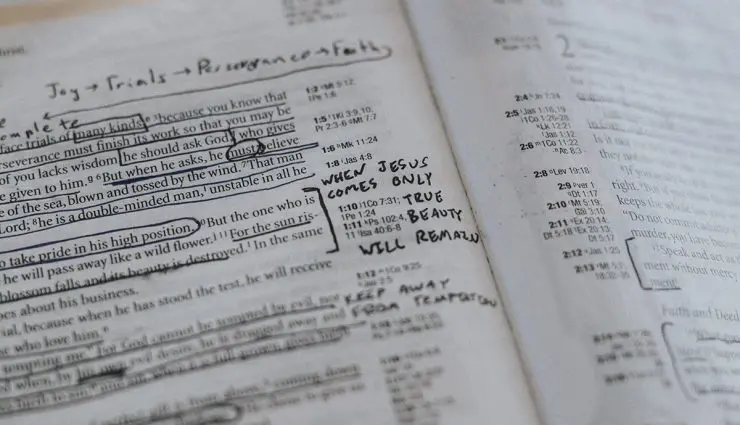Jesus-style Disciple Making and True Discipleship
This post is part of series by Discipleship.org leadership, which gives reasons why we believe that Jesus-style disciple making is the best path forward for families, ministries, and especially churches. This post is written by Bobby Harrington and Curtis Erskine.
We champion Jesus-style disciple making, and we hope you will join us.
I (Bobby) first learned the meaning of discipling relationships by being discipled—I was led to King Jesus and learned how to walk with him by my French professor at the University of Calgary. My professor also became a friend to my family, helping lead my mom, my dad, and my brother-in-law to faith. He discipled me in a relational, life-on-life, heart-to-heart way. He helped me become a true disciple, and it caused a hairpin turn in the trajectory of my life.
I (Curt) have a completely different story of how I found Jesus-style disciple making. I grew up in a Southern, conservative, traditional, Bible-believing Baptist church where I came to believe in Jesus at a young age. However, even though I really did believe in Jesus, I was not taught to be a disciple of Jesus.
Rather than the relationships and friendships within the church being used to teach me to imitate and obey Jesus, they were instead leveraged to teach me to be a disciple of our particular religious culture. While I was taught about Jesus and the Bible, it was always through a particular set of lenses that distorted everything.
At a certain point, I realized that something was seriously wrong, but I had no idea what exactly it was. Through a couple of decades of twists and turns, I ended up in seminary searching for the answer. It was through God’s providence (in an elective class) that I first read Bobby Harrington and Jim Putman’s DiscipleShift, along with several other books on being a disciple of Jesus.
From that point on, I became fully convinced of and committed to Jesus-style disciple making. I believe that it is the missing piece in the modern church, the sole purpose of the church, and the only solution to shift our churches toward becoming what they were meant to be.
We hope that you will adopt Jesus-style disciple making like us—it will help you to be what God wants you to be.
Let me (Curt) explain.
WHY IDENTIFY AS A DISCIPLE NOT JUST A CHRISTIAN?
The New Testament’s favorite word to describe God’s children is “disciple.” A derivative of this word is used about 270 times, while the word “Christian” is used only three times. Acts 11 is the first place in the Bible that the word “Christian” is used. Luke wrote that, “The disciples were called Christians first at Antioch” (Acts 11:26).
Notice that “Christian” was simply another name for a disciple of Jesus. You had to first be a disciple of Jesus in order to be called a Christian. The concept of being a Christian and then becoming a disciple is completely foreign to the New Testament.
Ultimately, the gospel of Jesus is not just about escaping hell and getting a free trip to heaven when you die. It is so much more than just that. The gospel is about being conformed into the image of King Jesus by imitating and obeying him as his disciple (through the power of the Holy Spirit of course). The purpose of being conformed into the image of Jesus (who is the perfect image of God) is so that human beings might bring glory to God by being re-conformed into the image of God that we were originally created to be (Gen. 1:26–28; 1 Cor. 11:7; 2 Cor. 3:18).
While disciples of Jesus will not be completely conformed into his image until our glorification, the process begins now (Romans 8:29). This is why being a disciple of Jesus is not optional but absolutely necessary. This is what Jesus meant by “following him.” This is what it means to be “changed by Jesus.” This is the mission of Jesus: to rescue, redeem, and restore the image of God within fallen human beings so that the glory that God is due might be rendered unto him.
This is why Jesus-style disciple making is not just an option for the local church. We believe, as Jim Putman and Robert Coleman have persuasively argued, that King Jesus’ methods are just as divine as his message.
This is why we must make the kind of disciples that Jesus made—and make them the way that Jesus made them.
JESUS’ METHOD
In case you missed it, we define a disciple as someone who is “following Jesus, being changed by Jesus and is committed to the mission of Jesus” (Matthew 4:19). How did Jesus make this kind of disciple?
Answer: he was intentional, relational, and formational.
- Intentional: Jesus was deliberate and guided by a master plan.
- Relational: Jesus was personally engaged, guided by a cross-shaped love for people (John 13:34–35).
- Formational: Jesus formed his disciples by teaching, coaching, challenging, and modelling so they could become more and more like him, ultimately spending 65 to 90 percent of their time making disciples just as Jesus did.
Jesus’ method of disciple making is about connecting with people in a relational, personal way—the way of cross-shaped love. It is a life-on-life environment, heart-to-heart centered, and obedience focused. It is motivated by love, fueled by the Holy Spirit, and the result is dramatic transformation. Jesus’ method shows us that disciples are handcrafted, one life at a time, not mass-produced in a weekly church service or class.
Don’t miss this – disciples are hand crafted, not mass produced.
When we look at Jesus, we remember disciple making is for everyday people. Every disciple, compelled by love and modeling themselves after Jesus, should follow the Great Commission. Too many Christians assume that disciple making is for pastors or professional Christians. If the ministry of Jesus teaches us anything, it’s that anybody—no matter who they are—can become a disciple maker.
For example, I (Bobby) know a man who serves Jesus in operating rooms in an orthopedic clinic. A few years ago, Jesus rescued him, through the help of an older Christian, from the bondage of pornography. He and his wife were on the brink of divorce, but at just the right time, Jesus scooped them up and turned a story of destruction into a story of redemption. Now this man leverages his influence with the medical staff and in the church to disciple dozens of men into obedience to all the teachings of Jesus.
He is an everyday disciple making disciple – he and others like him are the ones who will change the world, one person at a time.
WHERE TO START
Numerous disciple-making models that are intentional, relational and formational are available. At Discipleship.org, we aggregate over 30 disciple-making ministries, all with models that can help, so you should check them out. Moreover, we are currently developing our online community, the Collective, which will allow pastors, church leaders, and anyone else involved in Jesus style disciple making to interact with other disciple makers who are working through the same issues, questions, and challenges as themselves.
But like most newcomers to the disciple making conversation, you are likely looking for a model to investigate. We think you should check out our free resources and become well educated before you fully implement a strategy, but we know what it is like to want something NOW. And with the changes in our culture, now might be the best time to dip your toe in and make the shift to Jesus-style disciple making in your church.
So here is one simple path.
The lead pastor/minister is best positioned to lead the church in embracing Jesus-style disciple making. If you are not that person, you can take the steps below and apply them to any ministry or almost any church.
Start with these steps:
- Fast, pray and find a good model. This first step is crucial. Notice the order: fast and pray, then search for and adopt a model. Again, we have lots of partnering organizations at Discipleship.org who would love to mentor and coach you.
- Personally live the model. I (Bobby) have spent 15 years helping church leaders to shift their churches to a disciple-making focus, and the biggest lesson is clear: The church will never adopt Jesus-style disciple making until the lead pastor or person is charge of a ministry first embraces and lives it out personally. Once you pick a model, try to live it out first, personally.
- Live the model with your leaders. The pastor/minister must lead the church’s or ministries’ leaders so that everyone on the leadership team personally practices disciple making. You can’t lead where you don’t go; you can’t teach what you don’t know; and you can’t give to others what you can’t show in your own life.
- Create a churchwide or ministry disciple-making system. The final phase is many months or a few years down the road when you turn your focus to the church or ministry. You have got to first be what you want your church or ministry to be, then you help the church or ministry to follow you. Everyday disciples need leaders to show them how to make disciples and to give them a practical personal system for making disciples.
Adopt a disciple-making model that is simple, effective and reproducible.
Remember that last sentence. It will be important later.
MAKING DISCIPLES IN A CHALLENGING WORLD
It is getting more and more challenging to be disciples and make disciples as our culture changes. Most church leaders want a method. “Can you just tell us how to do it at my church?” they say. The problem with that question is that there is not a one-size-fits-all answer. The principles of Jesus’ method never change, but their application does change, depending on the cultural context. Again, at the risk of being repetitive, that is why we have multiple partnering organizations at Discipleship.org
But if you want to focus on one method, right now, the following model is one of the best in our current cultural moment.
The answer is phygital disciple making.
Phygital is the concept of using technology to bridge the physical world with the digital world. Here is the basic idea: create small disciple-making groups that combine smaller in-person gatherings with regular digital gatherings (through Zoom, Google Hangouts, etc.).
In the ideal, a disciple-making leader will initiate and lead the following process.
- Form a group of 3 to 5 people. This is a specific group size, ideal for the phygital environment. A same-gender group is best. I (Bobby) and Alex Absalom wrote Discipleship That Fits to explain the difference sizes of groups and why this size is a good one. Hold the formation meeting in person, with social distancing protocols in place, and establish a group agreement.
- Meet weekly online. The regularity of the meeting is important (for relationships and spiritual formation) and, if you are careful to keep it to one hour, it is not too difficult. Our men’s group met every Tuesday night. They helped get their kids in bed and then easily joined the group without the loss of work and travel time during the day.
- Meet monthly in person. As a part of your holistic model, meet in person. In the monthly meeting, it is just the 4-5 of you. We think it is important to serve the poor, have a meal together or observe the sabbath together. Jason Dukes wrote a helpful book called, Inviting Along, which explains the seven rhythms of a “with Jesus lifestyle” and this model can be built around those rhythms.
Group size can vary, as can meeting schedules, but we personally field-tested this phygital approach long before COVID-19. It worked well during COVID-19 because it combined the key elements of effective disciple making, while in the digital space. I led the men in my group on an intentional path, exploring the teachings of Jesus. We enjoyed good relationships (the monthly face-to-face meeting is crucial for relationships), and there was significant spiritual formation.
If you want to learn more about this model, we will point you to one of our partnering ministries who can help you – email [email protected].
We also believe phygital describes a good path into the future. With advances in technology, we will soon have new ways to disciple people. For example, Facebook is planning to open virtual reality rooms in 2022. Soon virtual in-person meetings, with all the elements of virtual reality, will be as common as Zoom meetings became in 2020.
We hope to engage in the development of this space in the future in the Discipleship.org Collective. We are not telling you just to promote how our ministry can help you to be what God wants you to be, but because we are concerned that too many church leaders are stuck in the past and the future is coming faster than we think.
Let’s be disciple makers for Jesus who engage the future for his kingdom!
With tighter budgets and shifting ministry schedules, many church leaders are finding themselves reassessing their church’s most basic priorities. In the end, the goal of the gospel and disciple making is allegiance and obedience to King Jesus and conformity to His image.
We are going to say it again – personal disciple making is the method.
Don’t stop until you have found a model that is simple, effective, and reproducible.
Now before our final few paragraphs, go grab a coffee so you can think through what Curtis is about to write.
A FINAL WORD
Whenever I (Curt) write about Jesus-style disciple making, I like to include what I consider to be one of the most sobering and under-quoted passage in the Bible. The Apostle John was one of Jesus’ first disciples, Jesus’ earthly best friend, and probably understood Jesus-style disciple making better than anyone else. He wrote:
“We know that we have come to know [Jesus] if we keep his commands. Whoever says, ‘I know him,’ but does not do what he commands is a liar, and the truth is not in that person. But if anyone obeys his word, love for God is truly made complete in them. This is how we know we are in him: Whoever claims to live in him must live as Jesus did” (1 John 2:3-6).
Scripture is absolutely clear on this. Under the inspiration of the Holy Spirit, John wrote that if we do not keep King Jesus’ command to make disciples who keep everything He commanded (Matthew 18:19-20); and if we do not do it the way that King Jesus did it; then we are liars and do not know Him. This seems harsh until you understand that Jesus-style disciple making is not just about saving people from hell. Jesus-style disciple making is about rescuing, redeeming, and restoring the image of God within human beings; so that they might render unto God the glory that he is due.
If the desire to see human beings restored to their original creational purpose (along with the positive effects of the restoration of their relationships with other image bearers) is not enough to motivate us, then surely seeing God receive the glory that He is due should be. If we are concerned for neither of these things, then it is understandable why John would call us liars.
At Discipleship.org we are fully committed to seeing believers and churches adopt Jesus-style disciple making for these reasons. We are committed to both creating content and being able to point disciples and disciple makers to content created by our partners in order to equip them to be and make disciples of King Jesus.
In addition to the free resources that we offer, we hope you will join our Disciple Making Collective, where you can interact with other disciples and disciple makers. We realize that you may not have the support you need locally to enact Jesus-style disciple making or maybe you just need help with tools. We exist to give you that support and encouragement.
You cannot do it alone – you need a tribe or a network of discipleship-first people to help you.






